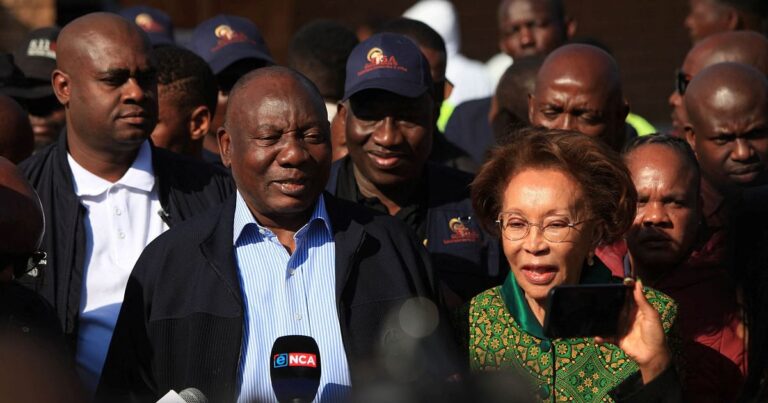ANC wins, beating opinion polls
In the past few months, some polls have shown the ANC’s approval rating hovering around 40 percent, a big drop from its performance in 2019, when it won 57.5 percent of the vote. But tracking polls suggest that the party’s approval rating is rising in the weeks leading up to Election Day. Analysts say the party has an unrivaled grassroots organization, with activists going door-to-door in communities across the country.
The ANC’s vote share has fallen gradually over the past four election cycles, but it has never fallen by more than five percentage points from one election to the next.
If the ANC wins a majority, its leader, President Cyril Ramaphosa, will most likely be re-elected as head of state in the new National Assembly.
ANC loses majority, Ramaphosa steps down
If the ANC loses a significant majority and President Ramaphosa is criticised, the party could seek to oust him from his leadership position and nominate another person to be elected by the National Assembly as South Africa’s president.
They need to act fast because the constitution requires a new National Assembly to convene within 14 days of the election results being announced to choose a president. Most analysts say this is unlikely unless the ANC receives 40% or less of the vote (the party’s worst-case scenario). A more likely scenario is that President Ramaphosa will hand power to his successor midway through his term in an orderly transition.
Whether Ramaphosa stays or goes, it is highly likely that he or the next ANC leader will become president after the election, and it would take a major upset for another party to have any chance of winning.
Whether Ramaphosa or someone else becomes president, if the ANC loses its majority it will need support from one or more other parties to stay in power.
ANC loses majority, seeks smaller partners
If the ANC gets close enough to 50 percent, it will try to make a pact with smaller parties to form a government. Analysts say the socially conservative Inkatha Freedom Party (IFP) could be the ANC’s first choice. The IFP has strong support in KwaZulu-Natal and about 5 percent support nationally, but IFP leaders have said they do not want to support the ANC.
The two parties were bitter rivals in the final years of apartheid but cooperated in the national unity government that was formed after elections in 1994. Other potential partners include the small Islamist party Al-Jama’a and the Patriotic Union, which draws support from the mixed-race community.

